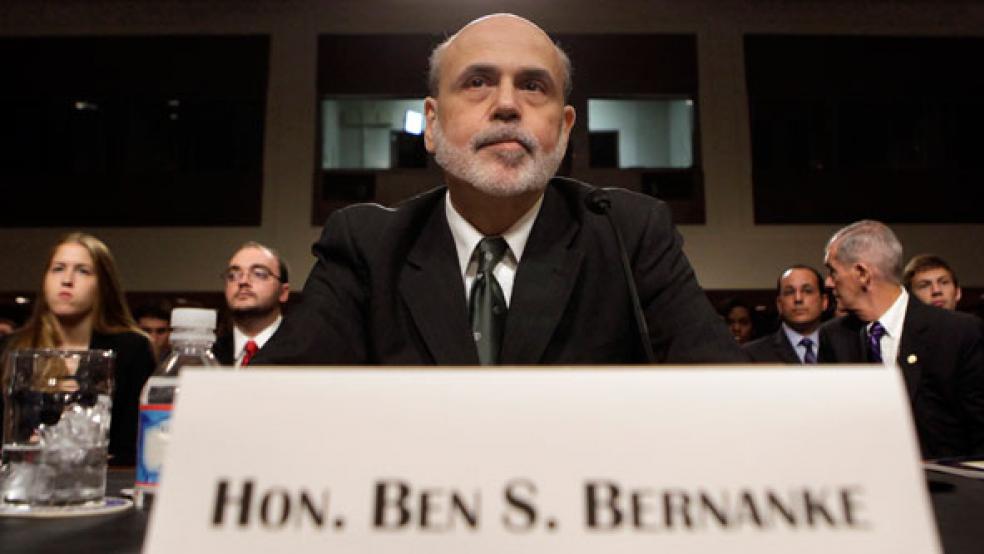“What did you know and when did you know it?”
That was the first question Senate Banking Committee chairman Tim Johnson, D-S.D., asked Fed Chairman Ben Bernanke during Tuesday’s semi-annual testimony on the state of the economy. Johnson was probing the Fed’s slow response to allegations of LIBOR interest rate manipulation in 2008, an issue that overshadowed concerns about the fiscal cliff and monetary policy. But the question did more than put Bernanke on the spot, it revealed the depth of the unsettling issues that will hound the Fed and its then chief of the New York Federal Reserve Bank, Timothy Geithner, now Secretary of Treasury, for months and perhaps years to come.

Bernanke’s answer will not assuage the growing list of borrowers who have charged in various federal lawsuits that manipulation of the key interest rate cost them billions of dollars in reduced payments from derivative contracts tied to floating rate debt. Virtually every debt transaction in the U.S. – an estimated $10 trillion in mortgage, credit card, student and business loans as well as derivatives contracts tied to those loans – is pegged to the London Interbank Offered Rate, which is based on the self-reported borrowing rates by large banks operating in the United Kingdom that includes at least two U.S.-based banks.
The Fed chairman repeated the agency’s defense that surfaced last month after Barclays PLC agreed to pay U.S. and British bank regulators $450 million to avoid criminal prosecution for misrepresenting its borrowing costs to the LIBOR panel. The settlement revealed that bank insiders were reporting lower rates during the financial crisis to avoid appearing like they were in trouble. But there are also investigations underway into the possibility that traders inside Barclays and other banks manipulated rates to benefit the banks’ bottom lines.
Bernanke said that Fed officials in Washington learned from press accounts about the false reporting of rates, but never heard allegations about deliberate manipulation, which would have sent rates in either direction depending on how it benefited traders. He notified British regulators and briefed top Bush administration officials at the White House, Treasury, Commodities Futures Trading Commission and Justice Department. He also set up an internal working group to monitor the situation, he testified, while Geithner wrote a memo outlining ways the British regulators could fix the problem.
What the Fed officials didn’t do, Bernanke admitted, was inform borrowers, lenders and the general public that there was a problem. “Fed action led to investigations and thinking about how we should better structure the LIBOR panel,” Bernanke said.
That later drew a heated response from Sen. Patrick Tooomey, R-Pa. The A number of municipalities and transit agencies in his state are among the thousands of jurisdictions that sold synthetic “fixed rate” bonds that bundle a Libor-based floating rate bond with a derivatives contract. When interest rates plunged, as they did in 2009 and beyond, those contracts should have paid off handsomely to offset the contractual inability for those agencies to refinance the floating rate bonds. Manipulating LIBOR would have substantially reduced the payments communities received on those contracts.
“I worry if municipalities in my state were systematically getting lower payments than what they should have,” Toomey said. “You have enormous influence. I’m not sure that the market participants were even aware” of what was happening.
On the economic front, Bernanke offered a grim prognosis for the second half of the year, but gave no hint as to whether or when the Fed will launch another round of monetary easing to stimulate growth. Europe remains a major concern; households and some businesses in the U.S. still face tight credit conditions; and the looming “fiscal cliff” – the expiration at year end of the Bush-era tax cuts, the payroll tax cut and the sequestration budget cuts – threatens to throw the economy into a “shallow” recession that would lead to 1.25 million fewer jobs being created in 2013, he testified.
“As is well known, U.S. fiscal policies are on an unsustainable path, and the development of a credible medium-term plan for controlling deficits should be a high priority,” he said. “At the same time, fiscal decisions should take into account the fragility of the recovery.”
The testimony was a depressing reminder that the ball is largely in Congress’ court when it comes to helping the economy. Resolution of the tax and spending issues would go a long way toward restoring confidence, he suggested, and the sooner that happened, the better. “Delaying everything and putting it off another year would be a very bad outcome,” he said.





